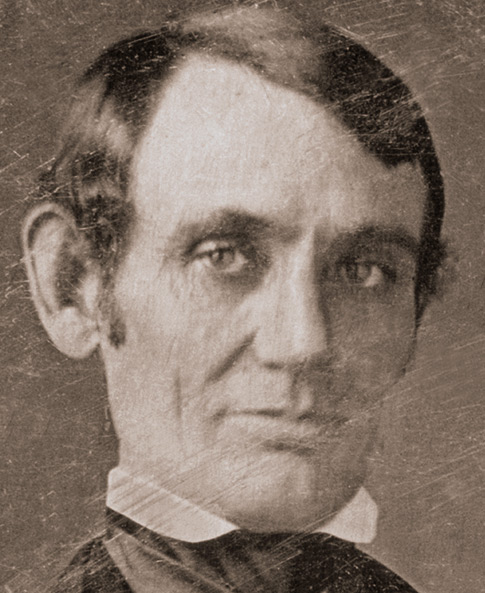 “Honest Abe” was a nickname that Abraham Lincoln embraced with pride. He believed in his own integrity and worked diligently to maintain his reputation as an honest politician and lawyer –something that was not always easy in either of those fields. To illustrate this theme within the Lincoln canon, we have pulled together a variety of documents mainly from Lincoln’s pre-presidential years that focus on his core beliefs and particular challenges to them. There are documents here concerning Lincoln’s main political and economic policy doctrines, his legal principles and his struggle with religious beliefs. The political documents sometimes involve campaign experiences, but we have tried to exclude general campaign materials from this category (you will find them in The Railsplitter theme) and instead have concentrated here on moments in Lincoln’s political career when his ethics seemed to be in jeopardy by the circumstances of his first chosen profession.
“Honest Abe” was a nickname that Abraham Lincoln embraced with pride. He believed in his own integrity and worked diligently to maintain his reputation as an honest politician and lawyer –something that was not always easy in either of those fields. To illustrate this theme within the Lincoln canon, we have pulled together a variety of documents mainly from Lincoln’s pre-presidential years that focus on his core beliefs and particular challenges to them. There are documents here concerning Lincoln’s main political and economic policy doctrines, his legal principles and his struggle with religious beliefs. The political documents sometimes involve campaign experiences, but we have tried to exclude general campaign materials from this category (you will find them in The Railsplitter theme) and instead have concentrated here on moments in Lincoln’s political career when his ethics seemed to be in jeopardy by the circumstances of his first chosen profession.
Essential Question
Did Lincoln deserve the nickname, “Honest Abe”?
Featured Documents
- July 31, 1846 –Handbill on Infidelity (#16)
- July 1, 1850 –Notes for a Law Lecture (#21)
- August 18, 1854 –Letter to Richard Yates (#15)
- October 20, 1858 –Letter to Norman B. Judd (#9)
- February 27, 1860 –Cooper Union Speech (#20)
Additional Documents
- January 11, 1837—Speech Concerning the State Bank (#76)
- February 22, 1842—Address to Washington Temperance Society (#121)
- February 25, 1842—Letter to Joshua Speed (#78)
- October 5, 1842—Letter to Joshua Speed (#79)
- January 12, 1848—Speech on War With Mexico (#55)
- June 12, 1848—Letter to William Herndon (#61)
- June 3, 1849—Letter to Joseph Underwood (#136)
- July 28, 1849—Letter to John Clayton (#130)
- July 1, 1854—Fragment on Government (#103)
- September 8, 1854—Letter to Richard Oglesby (#137)
- November 10, 1854—Letter to Jonathan Scammon (#123)
- November 27, 1854—Letter to Ichabod Codding (#124)
- August 11, 1855—Letter to Owen Lovejoy (#96)
- August 24, 1855—Letter to Joshua Speed (#138)
- September 8, 1856—Letter to Fillmore Men (#105)
- August 1, 1858—Definition of Democracy (#81)
- March 17, 1860—Letter to E. Stafford (#125)
- March 24, 1860—Letter to Samuel Galloway (#141)
- May 18, 1860—Endorsement (#142)
- July 16, 1860—Instructions for John Nicolay (#82)
- July 21, 1860—Letter to Abraham Jonas (#144)
- September 1, 1862—Meditation on Divine Will (#35)
- October 3, 1862—Proclamation of Thanksgiving (#69)
- August 17, 1863—Letter to James Hackett (#131)
- November 2, 1863—Letter to James Hackett (#132)
Multi-Media Resources
- Mary Beth Donnelly, Philosopher in Chief, Google, Understanding Lincoln, Fall 2013
- Marsha Greco, Abraham Lincoln’s Religion, Prezi, Understanding Lincoln, Fall 2013
- Dustin Hudak, Creation of Thanksgiving, Prezi, Understanding Lincoln, 2016
- Todd Jansson, The Inner Lincoln, Weebly, Understanding Lincoln, 2016
- Ian McDougall, Abe Lincoln: Fatalist, Weebly, Understanding Lincoln, 2016
Further Reading
- Michael Burlingame, “Honest Abe,” multi-media excerpt from Abraham Lincoln: A Life (2008), Journal Divided,(August 26, 2010) http://housedivided.dickinson.edu/sites/journal/2010/08/26/honest-abe/
- Richard J. Carwardine, “Lincoln, Evangelical Religion, and the American Political Culture in the Era of the Civil War,”Journal of the Abraham Lincoln Association 18 (Winter 1997), http://hdl.handle.net/2027/spo.2629860.0018.10
- Matthew Pinsker, “Man of Consequence: Abraham Lincoln in the 1850s,” Illinois History Teacher 16 (2009), http://www.lib.niu.edu/2009/iht09160116.html
- Mark E. Steiner, “The Lawyer as Peacemaker: Law and Community in Abraham Lincoln’s Slander Cases,” Journal of the Abraham Lincoln Association 16 (Summer 1995), http://hdl.handle.net/2027/spo.2629860.0016.203
